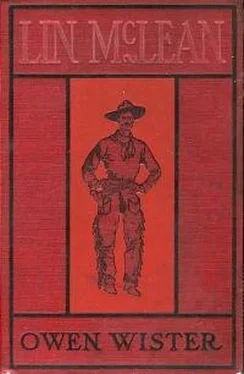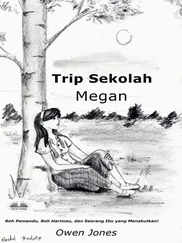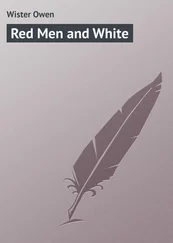Owen Wister - Lin McLean
Здесь есть возможность читать онлайн «Owen Wister - Lin McLean» весь текст электронной книги совершенно бесплатно (целиком полную версию без сокращений). В некоторых случаях можно слушать аудио, скачать через торрент в формате fb2 и присутствует краткое содержание. Жанр: Вестерн, на английском языке. Описание произведения, (предисловие) а так же отзывы посетителей доступны на портале библиотеки ЛибКат.
- Название:Lin McLean
- Автор:
- Жанр:
- Год:неизвестен
- ISBN:нет данных
- Рейтинг книги:3 / 5. Голосов: 1
-
Избранное:Добавить в избранное
- Отзывы:
-
Ваша оценка:
- 60
- 1
- 2
- 3
- 4
- 5
Lin McLean: краткое содержание, описание и аннотация
Предлагаем к чтению аннотацию, описание, краткое содержание или предисловие (зависит от того, что написал сам автор книги «Lin McLean»). Если вы не нашли необходимую информацию о книге — напишите в комментариях, мы постараемся отыскать её.
Lin McLean — читать онлайн бесплатно полную книгу (весь текст) целиком
Ниже представлен текст книги, разбитый по страницам. Система сохранения места последней прочитанной страницы, позволяет с удобством читать онлайн бесплатно книгу «Lin McLean», без необходимости каждый раз заново искать на чём Вы остановились. Поставьте закладку, и сможете в любой момент перейти на страницу, на которой закончили чтение.
Интервал:
Закладка:
He went to the hotel. There were several hours for Lin to wait. He walked up and down the platform till the stars came out and the bright lights of the town shone in the saloon windows. Over across the way piano-music sounded through one of the many open doors.
"Wonder if the professor's there yet?" said Lin, and he went across the railroad tracks. The bartender nodded to him as he passed through into the back room. In that place were many tables, and the flat clicking and rattle of ivory counters sounded pleasantly through the music. Lin did not join the stud-poker game. He stood over a table at which sat a dealer and a player, very silent, opposite each other, and whereon were painted sundry cards, numerals, and the colors red and black in squares. The legend "Jacks pay" was also clearly painted. The player placed chips on whichever insignia of fortune he chose, and the dealer slid cards (quite fairly) from the top of a pack that lay held within a skeleton case made with some clamped bands of tin. Sometimes the player's pile of chips rose high, and sometimes his sumptuous pillar of gold pieces was lessened by one. It was very interesting and pretty to see; Lin had much better have joined the game of stud-poker. Presently the eye of the dealer met the eye of the player. After that slight incident the player's chip pile began to rise, and rose steadily, till the dealer made admiring comments on such a run of luck. Then the player stopped, cashed in, and said good-night, having nearly doubled the number of his gold pieces.
"Five dollars' worth," said Lin, sitting down in the vacant seat. The chips were counted out to him. He played with unimportant shiftings of fortune until a short while before his train was due, and then, singularly enough, he discovered he was one hundred and fifty dollars behind the game.
"I guess I'll leave the train go without me," said Lin, buying five dollars' worth more of ivory counters. So that train came and went, removing eastward Mr. McLean's trunk.
During the hour that followed his voice grew dogged and his remarks briefer, as he continually purchased more chips from the now surprised and sympathetic dealer. It was really wonderful how steadily Lin lost — just as steadily as his predecessor had won after that meeting of eyes early in the evening.
When Lin was three hundred dollars out, his voice began to clear of its huskiness and a slight humor revolved and sparkled in his eye. When his seven hundred dollars had gone to safer hands and he had nothing left at all but some silver fractions of a dollar, his robust cheerfulness was all back again. He walked out and stood among the railroad tracks with his hands in his pockets, and laughed at himself in the dark. Then his fingers came on the check for Omaha, and he laughed loudly. The trunk by this hour must be nearing Rawlins; it was going east anyhow.
"I'm following it, you bet," he declared, kicking the rail. "Not yet though. Nor I'll not go to Washakie to have 'em josh me. And yonder lays Boston." He stretched his arm and pointed eastward. Had he seen another man going on in this fashion alone in the dark, among side-tracked freight cars, he would have pitied the poor fool. "And I guess Boston'll have to get along without me for a spell, too," continued Lin. "A man don't want to show up plumb broke like that younger son did after eatin' with the hogs the bishop told about. His father was a Jim-dandy, that hog chap's. Hustled around and set 'em up when he come back home. Frank, he'd say to me 'How do you do, brother?' and he'd be wearin' a good suit o' clothes and — no, sir, you bet!"
Lin now watched the great headlight of a freight train bearing slowly down into Green River from the wilderness. Green River is the end of a division, an epoch in every train's journey. Lanterns swung signals, the great dim thing slowed to its standstill by the coal chute, its locomotive moved away for a turn of repose, the successor backed steaming to its place to tackle a night's work. Cars were shifted, heavily bumping and parting.
"Hello, Lin!" A face was looking from the window of the caboose.
"Hello!" responded Mr. McLean, perceiving above his head Honey Wiggin, a good friend of his. They had not met for three years.
"They claimed you got killed somewheres. I was sorry to hear it." Honey offered his condolence quite sincerely.
"Bruck my leg," corrected Lin, "if that's what they meant."
"I expect that's it," said Honey. "You've had no other trouble?"
"Been boomin'," said Lin.
From the mere undertone in their voices it was plain they were good friends, carefully hiding their pleasure at meeting.
"Wher're yu' bound?" inquired Honey.
"East," said Lin.
"Better jump in here, then. We're goin' west."
"That just suits me," said Lin.
The busy lanterns wagged among the switches, the steady lights of the saloons shone along the town's wooden facade. From the bluffs that wall Green River the sweet, clean sage-brush wind blew down in currents freshly through the coal-smoke. A wrench passed through the train from locomotive to caboose, each fettered car in turn strained into motion and slowly rolled over the bridge and into silence from the steam and the bells of the railroad yard. Through the open windows of the caboose great dull-red cinders rattled in, and the whistles of distant Union Pacific locomotives sounded over the open plains ominous and long, like ships at sea.
Honey and Lin sat for a while, making few observations and far between, as their way is between whom flows a stream of old-time understanding. Mutual whiskey and silence can express much friendship, and eloquently.
"What are yu' doing at present?" Lin inquired.
"Prospectin'."
Now prospecting means hunting gold, except to such spirits as the boy Lin. To these it means finding gold. So Lin McLean listened to the talk of his friend Honey Wiggin as the caboose trundled through the night. He saw himself in a vision of the near future enter a bank and thump down a bag of gold-dust. Then he saw the new, clean money the man would hand him in exchange, bills with round zeroes half covered by being folded over, and heavy, satisfactory gold pieces. And then he saw the blue water that twinkles beneath Boston. His fingers came again on his trunk check. He had his ticket, too. And as dawn now revealed the gray country to him, his eye fell casually upon a mile-post: "Omaha, 876." He began to watch for them — 877, 878. But the trunk would really get to Omaha.
"What are yu' laughin' about?" asked Honey.
"Oh, the wheels."
"Wheels?"
"Don't yu' hear 'em?" said Lin. "'Variety,' they keep a-sayin'. 'Variety, variety.'"
"Huh!" said Honey, with scorn. "'Ker-chunka-chunk' 's all I make it."
"You're no poet," observed Mr. McLean.
As the train moved into Evanston in the sunlight, a gleam of dismay shot over Lin's face, and he ducked his head out of sight of the window, but immediately raised it again. Then he leaned out, waving his arm with a certain defiant vigor. But the bishop on the platform failed to notice this performance, though it was done for his sole benefit, nor would Lin explain to the inquisitive Wiggin what the matter was. Therefore, very naturally, Honey drew a conclusion for himself, looked quickly out of the window, and, being disappointed in what he expected to see remarked, sulkily, "Do yu' figure I care what sort of a lookin' girl is stuck on yu' in Evanston?" And upon this young Lin laughed so loudly that his friend told him he had never seen a man get so foolish in three years.
By-and-by they were in Utah, and, in the company of Ogden friends, forgot prospecting. Later they resumed freight trains and journeyed north In Idaho they said good-bye to the train hands in the caboose, and came to Little Camas, and so among the mountains near Feather Creek. Here the berries were of several sorts, and growing riper each day, and the bears in the timber above knew this, and came down punctually with the season, making variety in the otherwise even life of the prospectors. It was now August, and Lin sat on a wet hill making mud-pies for sixty days. But the philosopher's stone was not in the wash at that placer, nor did Lin gather gold-dust sufficient to cover the nail of his thumb. Then they heard of an excitement at Obo, Nevada, and, hurrying to Obo, they made some more mud-pies.
Читать дальшеИнтервал:
Закладка:
Похожие книги на «Lin McLean»
Представляем Вашему вниманию похожие книги на «Lin McLean» списком для выбора. Мы отобрали схожую по названию и смыслу литературу в надежде предоставить читателям больше вариантов отыскать новые, интересные, ещё непрочитанные произведения.
Обсуждение, отзывы о книге «Lin McLean» и просто собственные мнения читателей. Оставьте ваши комментарии, напишите, что Вы думаете о произведении, его смысле или главных героях. Укажите что конкретно понравилось, а что нет, и почему Вы так считаете.










